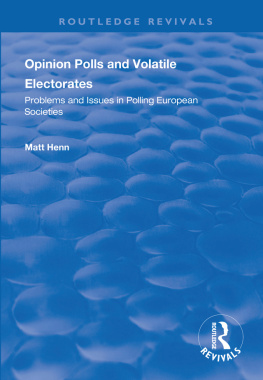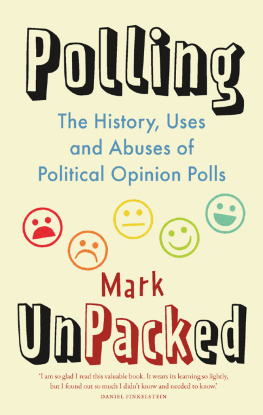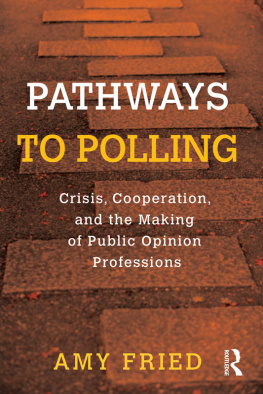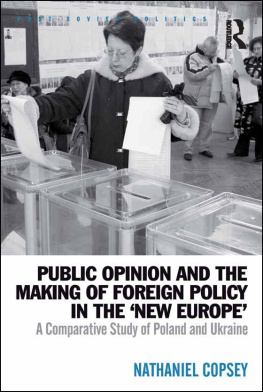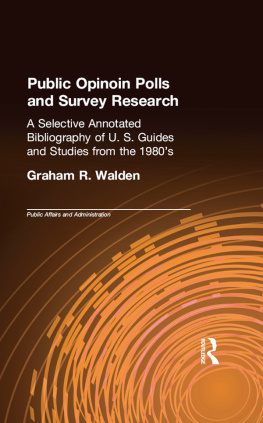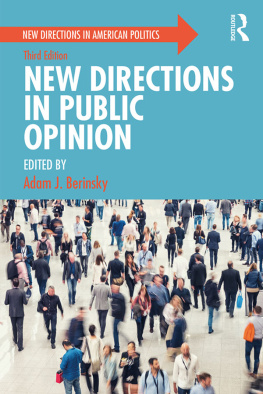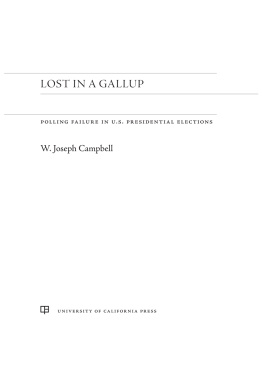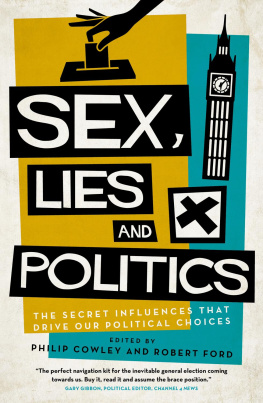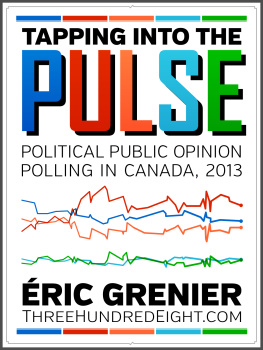OPINION POLLS AND VOLATILE ELECTORATES
This book is dedicated to Mel, and to our children, Jacob and Oliver.
Opinion Polls and Volatile Electorates
Problems and Issues in Polling European Societies
Matt Henn
Department of Economics and Politics
Nottingham Trent University
First published 1998 by Ashgate Publishing
Reissued 2018 by Routledge
2 Park Square, Milton Park, Abingdon, Oxon OX14 4RN
711 Third Avenue, New York, NY 10017, USA
Routledge is an imprint of the Taylor & Francis Group, an informa business
Copyright Matt Henn 1998
All rights reserved. No part of this book may be reprinted or reproduced or utilised in any form or by any electronic, mechanical, or other means, now known or hereafter invented, including photocopying and recording, or in any information storage or retrieval system, without permission in writing from the publishers.
Notice:
Product or corporate names may be trademarks or registered trademarks, and are used only for identification and explanation without intent to infringe.
Publishers Note
The publisher has gone to great lengths to ensure the quality of this reprint but points out that some imperfections in the original copies may be apparent.
Disclaimer
The publisher has made every effort to trace copyright holders and welcomes correspondence from those they have been unable to contact.
A Library of Congress record exists under LC control number: 98003177
ISBN 13: 978-1-138-32452-7 (hbk)
ISBN 13: 978-0-429-45081-5 (ebk)
The research for this book comes from a project which was conceived by the East Midlands Politics Research Group based at the then Trent Polytechnic at the end of the 1980s. Essentially, this sought to examine the extent of polling activities in local and national political affairs, and the contribution that polls make to the democratic process. As a corollary of this, the research focused on the intervention of polling in British politics in terms of its impact on voting intentions, the use of polling data by agencies which commission the research (political parties, pressure groups, and mass media organisations), and the strengths, limitations and weaknesses of established polling techniques and methodologies. However, by the beginning of 1990, the research took a more comparative focus following the dramatic events in Central and Eastern Europe which led to the overthrow of Stalinist bureaucracies there by mass movements of workers and students. The reports of opinion poll results in the European correspondence pages of the British press revealed the truly popular character of the opposition movements, and gave an indication of the role that polls themselves could take in articulating a mass public opinion, generating a sense of statistical community amongst those who opposed the Stalinist regimes, and ultimately in facilitating the democratic process. This sudden profusion of opinion polling contrasted with the virtual invisibility of polling activities in these countries under communist rule, and highlighted the scarcity of research in the field by the American and West European political science communities.
In the knowledge both of this research gap and of the energetic polling activities in the immediate aftermath of the collapse of communism, I decided to investigate the evolution of polling in the unique contexts of countries undergoing processes of political restructuring and revolutionary change. This enabled me to gain some sense of how such events impacted upon the development of polls, and how polls themselves could contribute to the unfolding processes of political democratisation in late-capitalist and post-communist societies. This book is the result of my attempts to analyse these developments.
Matt Henn Nottingham
Winter 1997
The responsibility for the work is mine. However, I am greatly indebted to a number of people who have helped in various ways over the long years of this research project. Firstly, to Mike Young and Larry Wilde at The Nottingham Trent University who helped to discipline me in my research. Secondly, to Robert Worcester at MORI who provided introductions to colleagues from other polling agencies in Britain and elsewhere, as well as substantial documentary materials for the research. In addition, I owe much to all my friends and colleagues in Poland, the Czech Republic, Hungary, Romania and Bulgaria, and especially to Cenek Adamec, Piotr Kwiatkowski, Petre Datcuiescu and Ognian Shentov, each of whom provided immeasurable assistance in organising my fieldwork. I would also like to acknowledge the Faculty of Economics and Social Sciences at The Nottingham Trent University, and the British Councils in Warsaw and Budapest who financed the research. Finally, particular thanks go to my family, and especially to Mel for her tireless support, and for putting up with me generally.
Opinion polling as an activity is well entrenched in advanced capitalist democracies. Polls are now an integral part of political landscapes, and they are likely to become even more so, particularly in relation to electoral politics in the future. Largely, this is as a result of the functions which they are able to perform in bringing political elites and citizens closer together within political systems. Polls are often characterised as consultative mechanisms through which political leaders can tap into and gauge the needs, interests and demands of the citizenry; for some writers, they ultimately facilitate political linkages and popular input into political decision-making. But polls may also play a significant role in the competition between political elites for power and influence. This is most obvious at the electoral level, where polls are often used as sources of political intelligence by political parties to gain an understanding of the dynamics of public opinion, and to maximise support and votes at elections.
This book aims to examine both the extent to which political opinion polling can contribute to democratic processes in different countries, and the degree to which polling is tied to the developing processes of restructuring and transition which are taking place in contemporary advanced societies. Specifically, the examination will focus on political opinion polling in both late-capitalist and post-communist societies. In doing so, it will consider two key related issues: firstly, how shifting political contexts impact upon the ability of polls to measure public opinion, and in so doing, affect their capacity to contribute to political democratisation in a meaningful and effective way; and secondly, whether polls extend or inhibit democratic processes.
Principally, this analysis is organised around the concept of Complex Politics. This has as its core an analytical framework which focuses upon various aspects of the political systems in both late-capitalist and post-communist societies which impinge directly upon political opinion polling. These are political culture, party systems, mechanisms for political participation, and the policy process. It is argued that, despite the obvious differences in context and recent history, the complexity of contemporary political environments in which polls operate in both types of political system are such as to display broadly similar issues and problems for opinion pollsters.
In the period between 1945 and 1989, the contexts for polling could not have been more different. In communist societies, there was a marked division between the state and society, with virtually no meaningful public input into the political process. Governments had an avowed mission to transform society according to an overriding commitment to a particular ideology, ostensibly on behalf of the citizenry. In such contexts, there was little scope for opinion polling. Opinion polls were perceived by governing elites as having little or no practical, philosophical or ideological relevance. Essentially, internal public politics did not exist. Politics were generally only public at the international level, with governments either extending friendship to other communist political systems, or engaged in an ideological offensive against global capitalism. Internally, societies were highly politicised in terms of party membership and public propaganda, but there was a notable absence of politics in the sense of publicly competing interests and adversarial opinions. One-party states were the norm, with political priorities limited to one goal (the emancipation of humankind) while class, and hence class struggle, was not officially acknowledged to exist. There was no effective choice between parties; there were no conflicting ideologies concerning how society and the economy should be run; and there were therefore presumed to be no political differences amongst citizens/voters. As Webb (1986, p. 11) put it:


